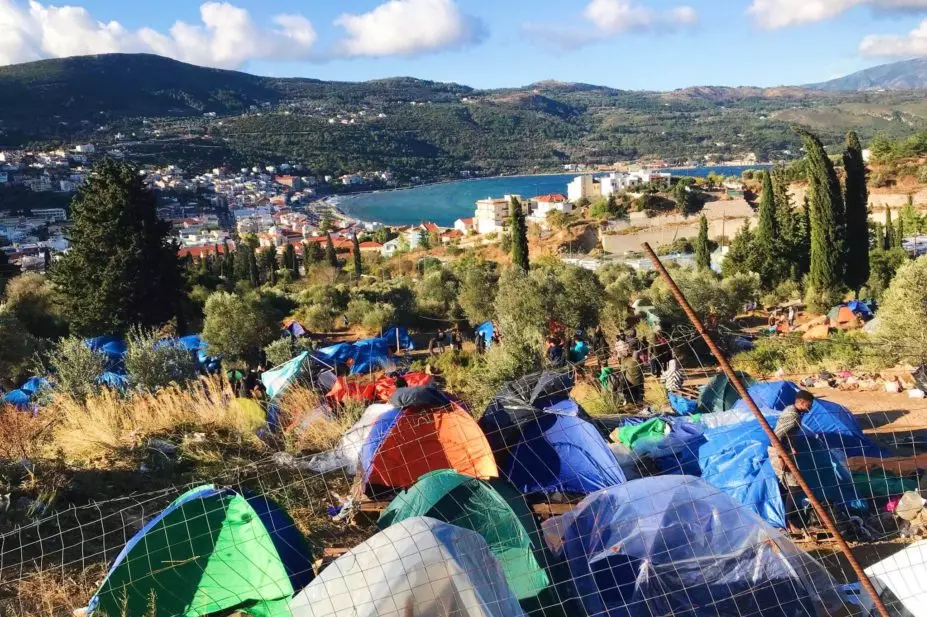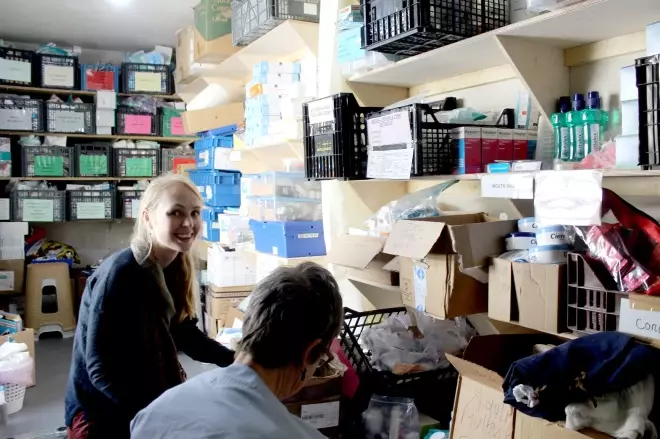
Courtesy of samosvolunteers.org
This blog was written before the coronavirus pandemic. Sadly, the healthcare pressures of the pandemic have also affected the Samos refugee camp: while the camp is on lockdown, patients’ access to healthcare has been further restricted. The camp’s clinic building has shifted to a pop-up outdoor clinic, owing to COVID-19 restrictions.
The Greek island of Samos, just off the coast of Turkey, is a beautiful mountainous place. The picture-perfect postcard I brought home from my time there shows a sunny promenade — its small white buildings lining the mountainside.
But there’s something missing. My postcard doesn’t show the expanding refugee camp above the town.
Here, there are more than 7,000 people living with inadequate hygiene facilities, and rubbish floods the camp. Some people sleep in one of the few overcrowded containers, but most are reduced to sheltering in flimsy tents, which offer little protection from Samos’ frequent storms.
The refugees have travelled from Syria, Afghanistan, the Congo, Iraq and Cameroon. And many others have arrived by boat from Turkey, fleeing war and persecution. Many refugees stay stranded on Samos for months to years, waiting for a decision on their asylum.
Despite the diversity of the people living in the camp, they all have one thing in common: the need for access to basic healthcare. On Samos, there is just one small hospital, which already struggles to serve the 6,500 Greek citizens of Samos town. With the camp, demand on the hospital has doubled, meaning it can only respond to emergencies — not the rat bites, scabies and deteriorating chronic conditions that come from living in the appalling camp conditions.
It wasn’t the first time I’d worked to support refugees. In 2017, I volunteered to respond to the refugee crisis by helping at a women’s space in an official refugee camp in Athens. This experience always stuck with me; after seeing how these living conditions led to health complaints, I wanted to return to Greece to put my pharmacy skills to good use.
Towards the end of 2019, I got in touch with Med’EqualiTeam — a charity offering free primary healthcare to refugees — to find out if I would be useful and, just two months later, I arrived in Samos, along with my husband, who was to work as the clinic receptionist.
My role as a volunteer at the clinic involved everything from counselling on scabies medication, helping to manage patients with chronic conditions, managing the clinic stock, and improving systems and patient compliance.

Source: Laura Burley
Hannah’s volunteer role at the camp’s clinic involved everything from counselling patients to improving the clinic’s systems
Having a pharmacist’s background has been incredibly useful in a humanitarian setting. I have been able to manage serious stock crises; we almost ran out of paracetamol around Christmas, and I sourced children’s vitamins for a baby who’d suffered burns from an open cooking stove in the camp. I have also helped doctors break down the language barrier to work out which medication a patient needed for their chronic condition, after struggling to access it over their journey across Turkey.
These moments felt good, but there were also some very difficult ones. Conversations I had with patients would frequently shed light on the harrowing life experiences that had brought them to this point. Histories of trauma, torture and rape were, unfortunately, not uncommon.
People often complained of insomnia, but how appropriate is teaching sleep hygiene to someone living in a tent alongside 7,000 others? How do you tell a patient suffering from post-traumatic stress that we have referred them to another healthcare provider, but they have a long waiting list? Hungry patients asked for referrals to a food distribution charity, but the charity was always operating at capacity, meaning only the most severe cases could be referred. Those remaining would have to queue for hours in line to get food.
But there’s cause for hope. The international teamwork taking place on the camp was incredible, and the positivity we felt from our community volunteers (refugees themselves) was inspiring. But the best highs came from seeing the patients’ smiles. In the small acts of kindness, people appreciated the humanity you showed them — having their health checked was the reassurance they needed after months of travelling hardship.
I’m now so aware of how lucky I am to live in a society with security, stability and all the benefits of the NHS, and I’ve not stopped reflecting on my time in Samos. I realise — from my position of privilege — that this isn’t about me, but I’m also aware of how I’ve grown, personally and professionally, since the experience.
We pharmacists are so valuable, and we have so many transferable skills; I encourage any pharmacist to volunteer in any capacity they can.
Laura Burley is a pharmacist passionate about global health, with hospital and primary care experience.
For more information visit: https://www.medequali.team/en/


